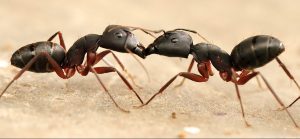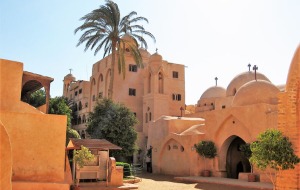Had I another lifetime, I might consider being an expert on ants, that is, a myrmecologist. Even if I studied one new ant a day, I wouldn’t exhaust the approximately 20,000 species on our planet.
Though I have chosen the monastic life according to my life’s calling, I’ve had several encounters with ants – some pleasant, others rather challenging, and a few on the humorous side. For instance, once during Christmas time, we opened gifts at the evening recreation. Somebody sent old Fr. Joseph a box of “Queen Anne Chocolates.” His gnarled, arthritic fingers slowly unraveled the plastic covering, when lo and behold! Ants started crawling over his hands and sleeves – they had been munching on chocolates for perhaps months. One Brother proposed that “Queen Ant Chocolates” would be a more suitable name.
Yes, ants can be a major nuisance, but can we learn from them? Specifically, can they serve as models for the 21st-century monk, indeed, all people? Let’s consider nine of their noble characteristics to find the ant-swer.
1) Diligence – Go to the ant, O sluggard; consider her ways, and be wise (Proverbs 6:6). Long admired for its seemingly endless energy and industry, the ant appears never to stop – one grain, two grains, and a large nest soon takes shape. Even in the evening, one can still find them busy at work. They moreover can lift 20 times their body weight and carry objects 50 times their size.
Similarly, monks have historically been hard workers – consider the Trappists, for example, in their production of cheese, fruitcakes, beer, and even coffins. Were it not for monk scribes, a great deal of ancient culture would be lost. Nonetheless, with the growth of modern conveniences, monks may be inclined to indolence, that is if they neglect to study the ant.
2) Seekers of Sweetness – All ants are fond of sweets and can detect its scent from far away. While sugar is a prime energy source, other foods such as insects and plant seeds fill out their diet. Interestingly, the ants have small holding containers in their thorax called the crop. They store sweet liquid there and then take it back to the nest to feed others mouth to mouth.

The monk also needs sweetness to survive; otherwise, he’s serving time, not God. The monk obtains sweetness in three ways, 1) the love of God in prayer, 2) reading Scripture; Your words are sweeter in my mouth than honey! (Psalm 119:103) 3) Trust, which turns bitter moments into sweetness. As the saints tell us, “Love transforms bitterness into sweetness.” When he observes an ant, therefore, let the monk recall his need for genuine sweetness.
3) Good Listeners – With super-sensitive antennae, the ant perceives food sources, danger, air currents, vibrations, and detection chemicals called pheromones. As ants pass each other, they touch their antennae to transmit and receive signals. This action is essential as most ants have somewhat poor vision and thus listen carefully to perceive the world about them. Each colony has a distinct scent which enables the ants to detect who’s who. Remarkably, some ants can sense earthquakes from several miles away before they take place; they consequently move the queen, larvae, and food to safety. 1
Similarly, monks need sensitive soul-antennae to receive the inspirations of the Holy Spirit. As St. John Vianney says, The saints were only sanctified by their great care to follow the inspirations God sent them. However, if persons neglect to clean their antennae, how can they perceive God’s voice? Hence, we do well to follow the ant’s example and refine our listening abilities.
4) Over-Winter Skills – Where do ants go in the winter? In the autumn, after consuming a lot of food to build up fat reserves, the majority of ants seek shelter deep in the earth and hibernate. Some ants, such as Messor aciculatus, store up food for the winter in intricately designed granaries, thus verifying the Scripture, Look at the ant…she prepares her food in summer, and gathers her sustenance in harvest. (Proverbs 6:6,8), or, again, Ants are creatures of little strength, yet they store up their food in the summer (Proverbs 30:25).
What can the monk learn from this example? St. Augustine suggests that like the ant, the Christian should stockpile the word of God in his heart during sunny times and so build up reserves of spiritual strength when winter (suffering) arrives.
5) Cleanliness – Ants are fastidious little creatures. They must protect the nest from dangerous pathogens and so remove debris such as dead insects. To ensure tidiness, they also set aside a pooping area in the nest. Ants likewise take great pains to keep their antennae clean – the least amount of dust can lessen its sensitivity. The following video reveals their remarkable cleaning abilities:
While monks in some regions may have little regard for bodily cleanliness, others take particular care to be clean. Regardless of external practices, all monks strive to serve God with a pure heart and a good conscience (1 Timothy 1:5). Thus, monks must be ever watchful of their thoughts and desires to have sensitive antennae toward God.
6) Constancy – Life has many challenges that require a continual exercise of resilience. In other words, only with persistence, perseverance, singleness of purpose, tenacity, and unwearied stick-to-itiveness, can one succeed. No one admires a quitter, while hero status belongs to the climber who reaches the peak.
The ant is a shining example in this regard. You may knock her backward – she jumps back up; put a blockade in her path – she walks over it; pour water in her way, and she’ll go around it until she reaches the goal.
With all the hardships embraced and comforts forsaken, the monk also has much need of constancy. As the Imitation of Christ says, To live in monasteries or religious communities, to remain there without complaint, and to persevere faithfully till death is no small matter. Therefore, if the monk should desire to persevere, let him take the ant as his tutor.
7) Organizational Skills – Ant nests sometimes grow to epic proportions, with millions of occupants. Such a society must be well-orchestrated. Each ant, be it a worker, drone, soldier, or queen, has his or her job to complete. Some look for food, while others tend to the queen, and yet others have nest-maintenance or soldiering duties. Thus, all the members synergize to prosper the nest.
Monasteries have learned well from the ant in this regard. The daily life is well regulated as each monk has his duty. For instance, while I’m cooking on Thursdays, other brothers tend to the laundry, garden, or take care of administration, etc. Some monastic orders, such as the Cistercians, organized the physical structure to the maximum efficiency; for instance, placing buildings directly above flowing streams to remove waste or create power.
However, keeping in mind that a smooth organization depends on the goodwill of its members, the modern monk always needs to study the ant’s humility.

8) Self – defense – Each of the nearly 20 thousand varieties of ants has hard-wired defense mechanisms. Some have shearing jaws, others deadly stings, and still others shoot acidic liquid from their thorax. Ant wars frequently occur with numerous fatalities. The ant has to be vigilant, brave, and prepared for battle at any moment.
The monk likewise has continual battles with himself, the allurements of the world, and the devil. His weapons include prayer, the Word of God, asceticism, and avoiding bad influences. If he hopes to withstand the pressures of temptation, let him consider the ant’s wariness.
9) Honoring the Queen – As you weed your garden, you may have royalty under your knees and didn’t realize it. Queen ants are remarkable and well worth studying in-depth. They are the longest living insect – up to 30 years. Because of her pivotal role in generating the ant population, the other ants treat the queen with particular respect. They regularly feed and clean her while the soldier ants defend her from potential danger. In a word, they worthily honor her majesty.

As she is the Mother of the King, Monks have historically shown great reverence for the Queen, that is, the Virgin Mary. Masterpieces of chant, hymns, poems, paintings, sculptures, chapels, and shrines are manifestations of this devotion. Unlike the ants that feed and clean their queen, the Virgin Mary nourishes her children with heavenly graces and helps them to become pure of heart. Nonetheless, latter-day monks have possibly grown cold towards the Heavenly Queen. Therefore, every time he sees an ant, let him reawaken his devotion.
Searching for Ant-swers
How can ants have virtue since they operate by instinct? Theologians distinguish between natural, acquired, and infused virtue in human beings. For example, a person may be charitable by nature, acquire greater love by effort, or be infused with charity, as when God pours the Holy Spirit into his or her heart (c.f. Romans 5:5).
In the case of the ants, however, they have only natural virtues or qualities that God placed into their character. He made them wise as Scripture says, perhaps that we might learn from them. This quality does not make them morally excellent but worthy of our admiration, and, as God commands it, the object of study and imitation.

Leave a comment